Travel & Tourism Law: Legislation, Ethics & Social Responsibility
VerifiedAdded on 2024/05/21
|23
|5074
|197
Report
AI Summary
This report provides a comprehensive analysis of the legal and ethical landscape within the travel and tourism sector. It begins by outlining the legal and regulatory framework, including the Development of Tourism Act and the roles of bodies like the Health and Safety Executive (HSE) and the Strategic Rail Authority (SRA). The report then examines surface, sea, and air transport law, emphasizing passenger rights and safety regulations. A significant portion is dedicated to health, safety, and security legislation, along with the Equality Act 2010, and their impacts on the industry. Contract and consumer protection legislation are also explored in detail, focusing on customer rights and remedies. Finally, the report delves into ethical dilemmas faced by the sector and analyzes the Corporate Social Responsibility (CSR) initiatives of a travel and tourism business, highlighting the importance of ethical conduct and social responsibility in the industry. This document is available on Desklib, a platform offering a variety of study resources for students.
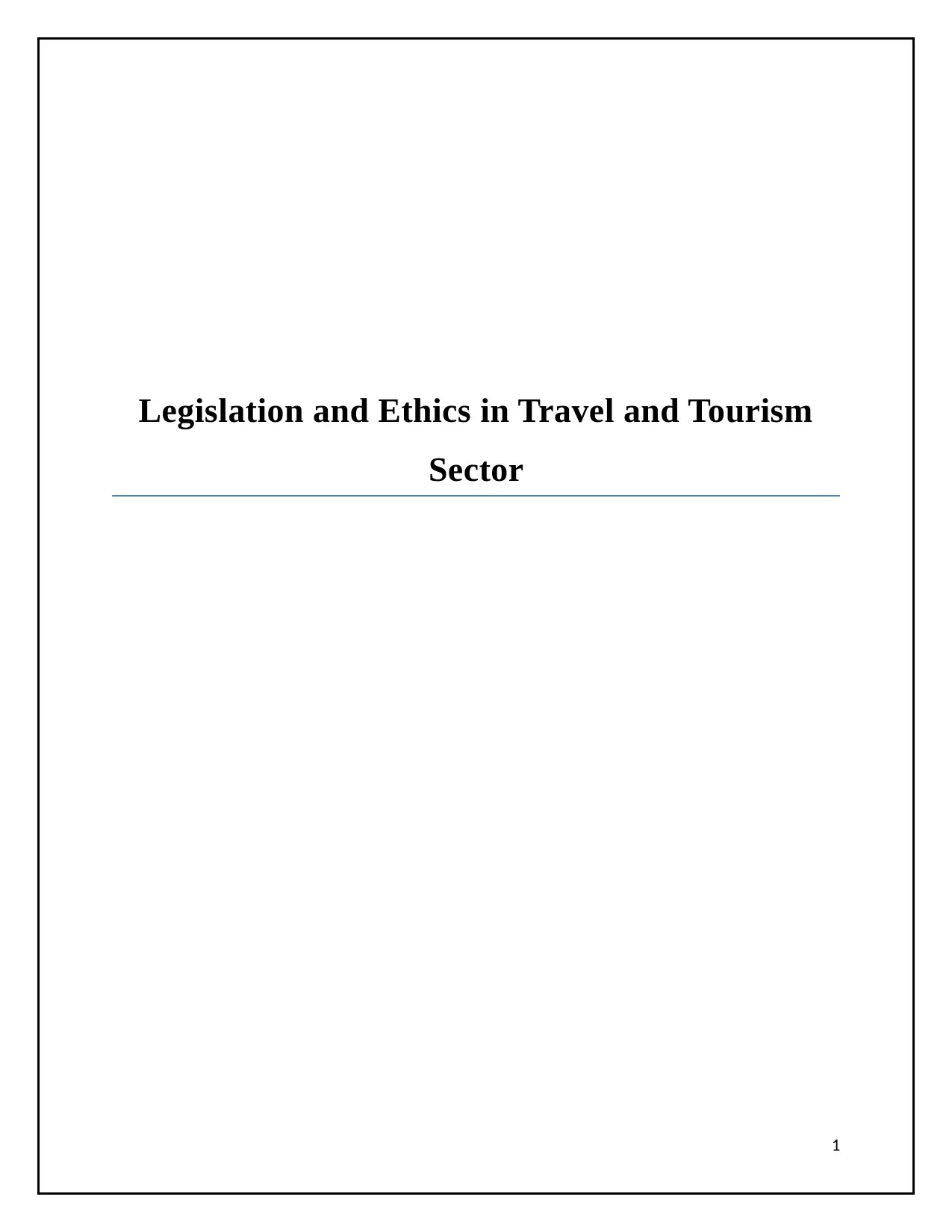
Legislation and Ethics in Travel and Tourism
Sector
1
Sector
1
Paraphrase This Document
Need a fresh take? Get an instant paraphrase of this document with our AI Paraphraser
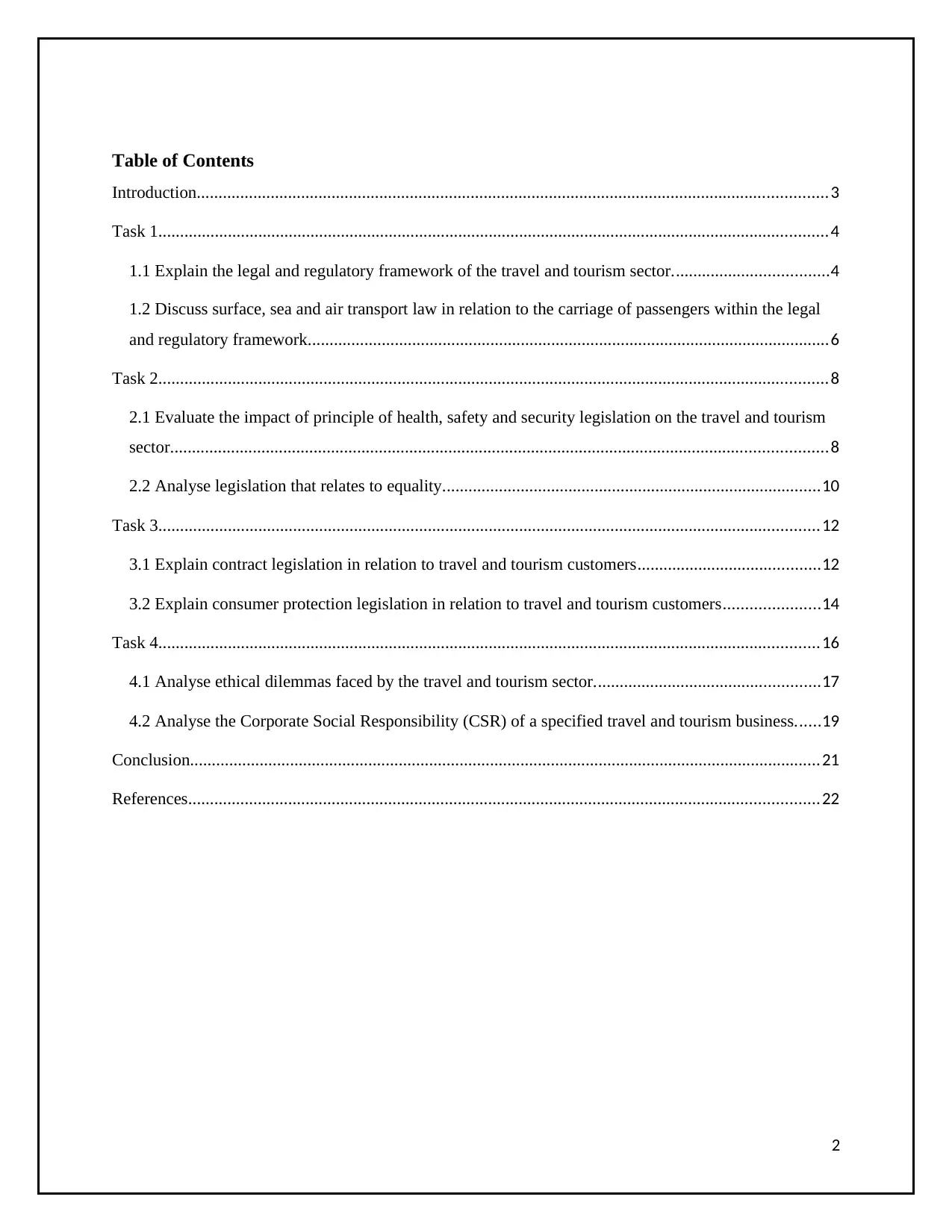
Table of Contents
Introduction.................................................................................................................................................3
Task 1..........................................................................................................................................................4
1.1 Explain the legal and regulatory framework of the travel and tourism sector....................................4
1.2 Discuss surface, sea and air transport law in relation to the carriage of passengers within the legal
and regulatory framework........................................................................................................................6
Task 2..........................................................................................................................................................8
2.1 Evaluate the impact of principle of health, safety and security legislation on the travel and tourism
sector.......................................................................................................................................................8
2.2 Analyse legislation that relates to equality.......................................................................................10
Task 3........................................................................................................................................................12
3.1 Explain contract legislation in relation to travel and tourism customers..........................................12
3.2 Explain consumer protection legislation in relation to travel and tourism customers......................14
Task 4........................................................................................................................................................16
4.1 Analyse ethical dilemmas faced by the travel and tourism sector....................................................17
4.2 Analyse the Corporate Social Responsibility (CSR) of a specified travel and tourism business......19
Conclusion.................................................................................................................................................21
References.................................................................................................................................................22
2
Introduction.................................................................................................................................................3
Task 1..........................................................................................................................................................4
1.1 Explain the legal and regulatory framework of the travel and tourism sector....................................4
1.2 Discuss surface, sea and air transport law in relation to the carriage of passengers within the legal
and regulatory framework........................................................................................................................6
Task 2..........................................................................................................................................................8
2.1 Evaluate the impact of principle of health, safety and security legislation on the travel and tourism
sector.......................................................................................................................................................8
2.2 Analyse legislation that relates to equality.......................................................................................10
Task 3........................................................................................................................................................12
3.1 Explain contract legislation in relation to travel and tourism customers..........................................12
3.2 Explain consumer protection legislation in relation to travel and tourism customers......................14
Task 4........................................................................................................................................................16
4.1 Analyse ethical dilemmas faced by the travel and tourism sector....................................................17
4.2 Analyse the Corporate Social Responsibility (CSR) of a specified travel and tourism business......19
Conclusion.................................................................................................................................................21
References.................................................................................................................................................22
2
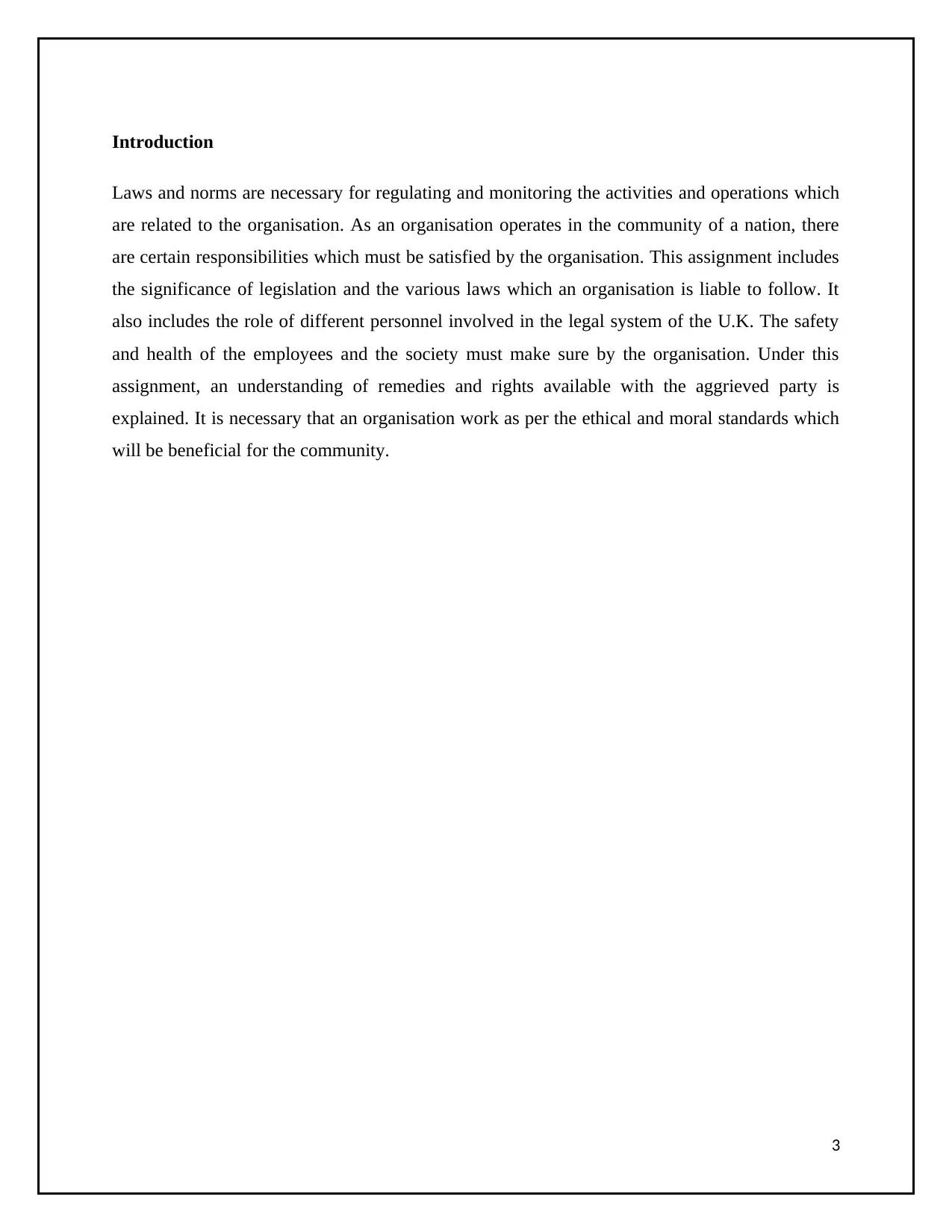
Introduction
Laws and norms are necessary for regulating and monitoring the activities and operations which
are related to the organisation. As an organisation operates in the community of a nation, there
are certain responsibilities which must be satisfied by the organisation. This assignment includes
the significance of legislation and the various laws which an organisation is liable to follow. It
also includes the role of different personnel involved in the legal system of the U.K. The safety
and health of the employees and the society must make sure by the organisation. Under this
assignment, an understanding of remedies and rights available with the aggrieved party is
explained. It is necessary that an organisation work as per the ethical and moral standards which
will be beneficial for the community.
3
Laws and norms are necessary for regulating and monitoring the activities and operations which
are related to the organisation. As an organisation operates in the community of a nation, there
are certain responsibilities which must be satisfied by the organisation. This assignment includes
the significance of legislation and the various laws which an organisation is liable to follow. It
also includes the role of different personnel involved in the legal system of the U.K. The safety
and health of the employees and the society must make sure by the organisation. Under this
assignment, an understanding of remedies and rights available with the aggrieved party is
explained. It is necessary that an organisation work as per the ethical and moral standards which
will be beneficial for the community.
3
⊘ This is a preview!⊘
Do you want full access?
Subscribe today to unlock all pages.

Trusted by 1+ million students worldwide
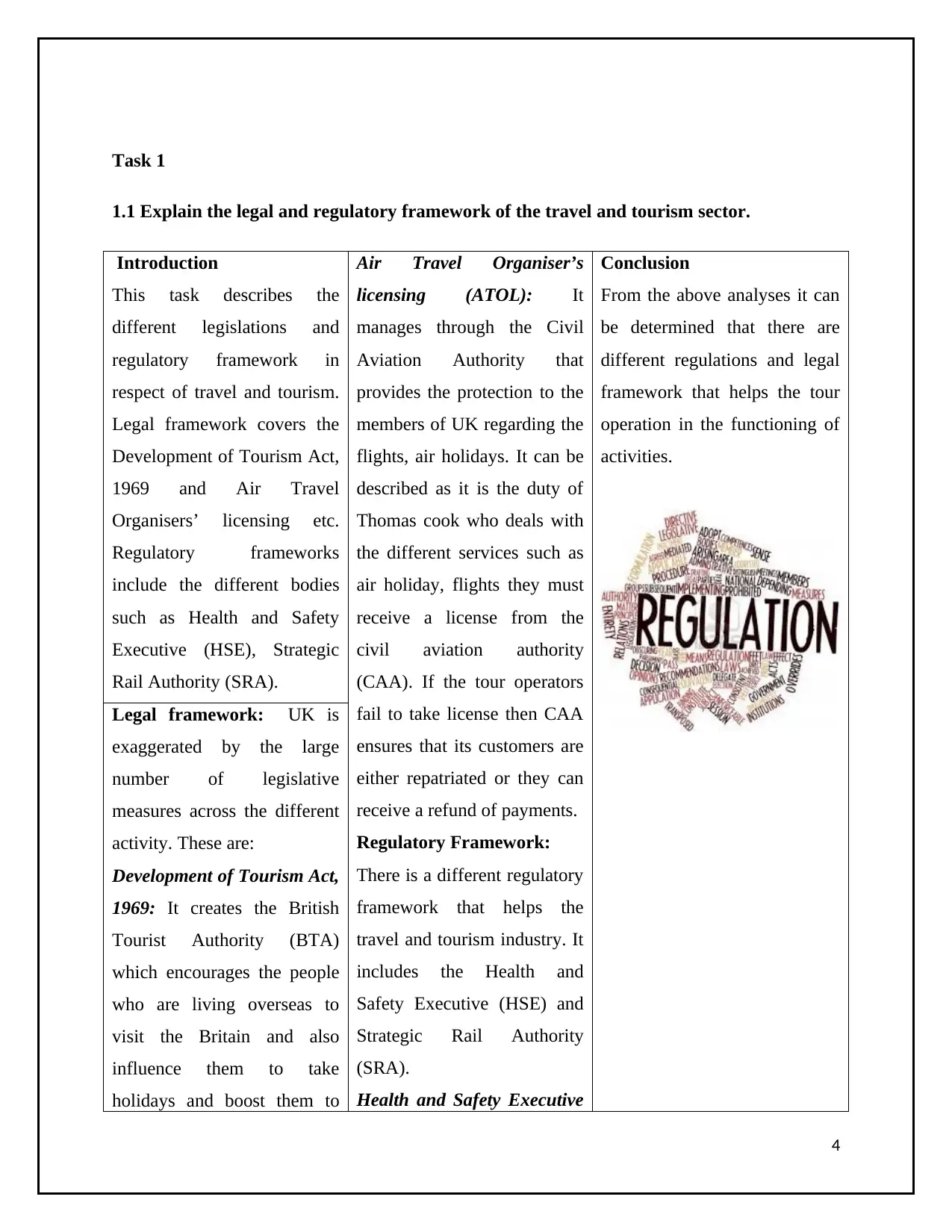
Task 1
1.1 Explain the legal and regulatory framework of the travel and tourism sector.
Introduction
This task describes the
different legislations and
regulatory framework in
respect of travel and tourism.
Legal framework covers the
Development of Tourism Act,
1969 and Air Travel
Organisers’ licensing etc.
Regulatory frameworks
include the different bodies
such as Health and Safety
Executive (HSE), Strategic
Rail Authority (SRA).
Air Travel Organiser’s
licensing (ATOL): It
manages through the Civil
Aviation Authority that
provides the protection to the
members of UK regarding the
flights, air holidays. It can be
described as it is the duty of
Thomas cook who deals with
the different services such as
air holiday, flights they must
receive a license from the
civil aviation authority
(CAA). If the tour operators
fail to take license then CAA
ensures that its customers are
either repatriated or they can
receive a refund of payments.
Regulatory Framework:
There is a different regulatory
framework that helps the
travel and tourism industry. It
includes the Health and
Safety Executive (HSE) and
Strategic Rail Authority
(SRA).
Health and Safety Executive
Conclusion
From the above analyses it can
be determined that there are
different regulations and legal
framework that helps the tour
operation in the functioning of
activities.
Legal framework: UK is
exaggerated by the large
number of legislative
measures across the different
activity. These are:
Development of Tourism Act,
1969: It creates the British
Tourist Authority (BTA)
which encourages the people
who are living overseas to
visit the Britain and also
influence them to take
holidays and boost them to
4
1.1 Explain the legal and regulatory framework of the travel and tourism sector.
Introduction
This task describes the
different legislations and
regulatory framework in
respect of travel and tourism.
Legal framework covers the
Development of Tourism Act,
1969 and Air Travel
Organisers’ licensing etc.
Regulatory frameworks
include the different bodies
such as Health and Safety
Executive (HSE), Strategic
Rail Authority (SRA).
Air Travel Organiser’s
licensing (ATOL): It
manages through the Civil
Aviation Authority that
provides the protection to the
members of UK regarding the
flights, air holidays. It can be
described as it is the duty of
Thomas cook who deals with
the different services such as
air holiday, flights they must
receive a license from the
civil aviation authority
(CAA). If the tour operators
fail to take license then CAA
ensures that its customers are
either repatriated or they can
receive a refund of payments.
Regulatory Framework:
There is a different regulatory
framework that helps the
travel and tourism industry. It
includes the Health and
Safety Executive (HSE) and
Strategic Rail Authority
(SRA).
Health and Safety Executive
Conclusion
From the above analyses it can
be determined that there are
different regulations and legal
framework that helps the tour
operation in the functioning of
activities.
Legal framework: UK is
exaggerated by the large
number of legislative
measures across the different
activity. These are:
Development of Tourism Act,
1969: It creates the British
Tourist Authority (BTA)
which encourages the people
who are living overseas to
visit the Britain and also
influence them to take
holidays and boost them to
4
Paraphrase This Document
Need a fresh take? Get an instant paraphrase of this document with our AI Paraphraser
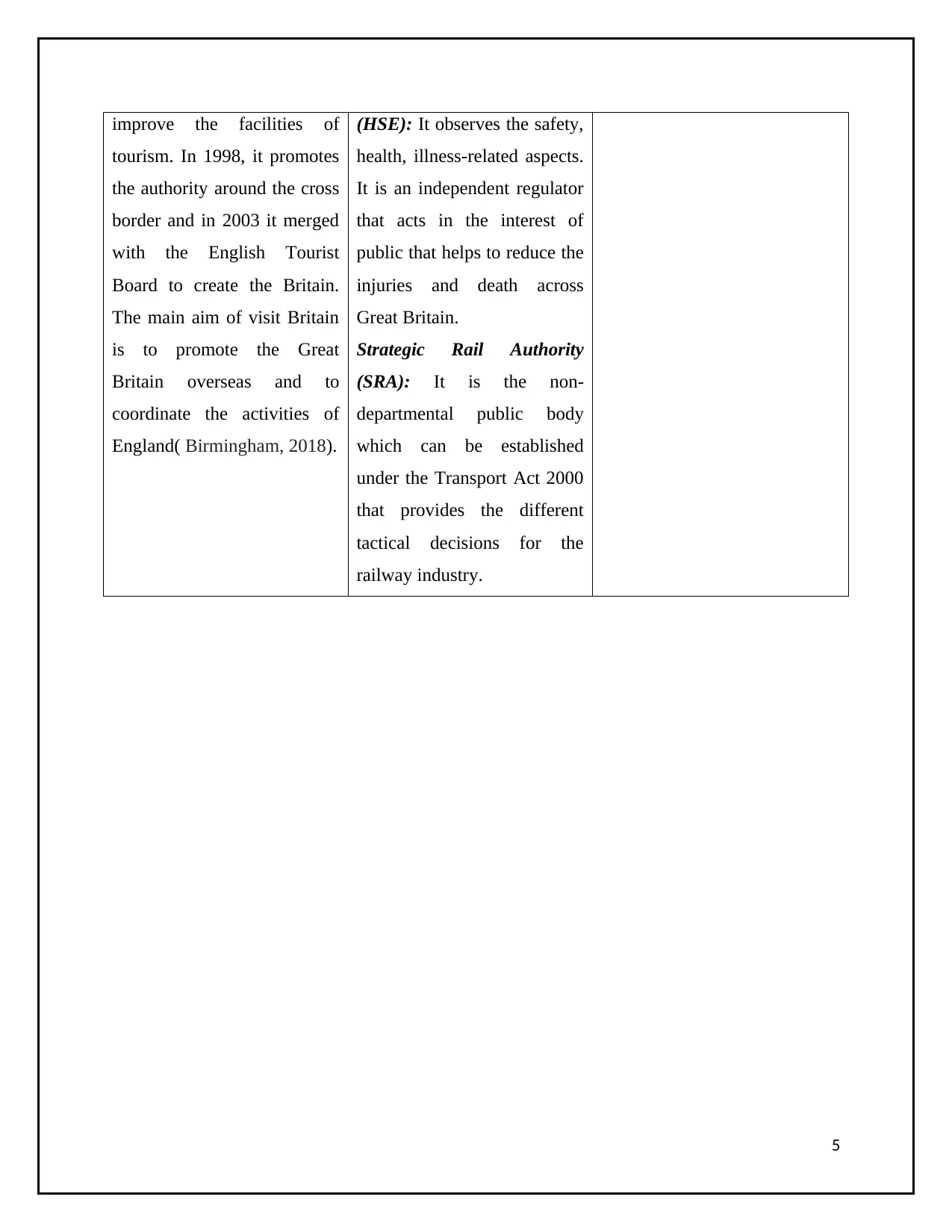
improve the facilities of
tourism. In 1998, it promotes
the authority around the cross
border and in 2003 it merged
with the English Tourist
Board to create the Britain.
The main aim of visit Britain
is to promote the Great
Britain overseas and to
coordinate the activities of
England( Birmingham, 2018).
(HSE): It observes the safety,
health, illness-related aspects.
It is an independent regulator
that acts in the interest of
public that helps to reduce the
injuries and death across
Great Britain.
Strategic Rail Authority
(SRA): It is the non-
departmental public body
which can be established
under the Transport Act 2000
that provides the different
tactical decisions for the
railway industry.
5
tourism. In 1998, it promotes
the authority around the cross
border and in 2003 it merged
with the English Tourist
Board to create the Britain.
The main aim of visit Britain
is to promote the Great
Britain overseas and to
coordinate the activities of
England( Birmingham, 2018).
(HSE): It observes the safety,
health, illness-related aspects.
It is an independent regulator
that acts in the interest of
public that helps to reduce the
injuries and death across
Great Britain.
Strategic Rail Authority
(SRA): It is the non-
departmental public body
which can be established
under the Transport Act 2000
that provides the different
tactical decisions for the
railway industry.
5
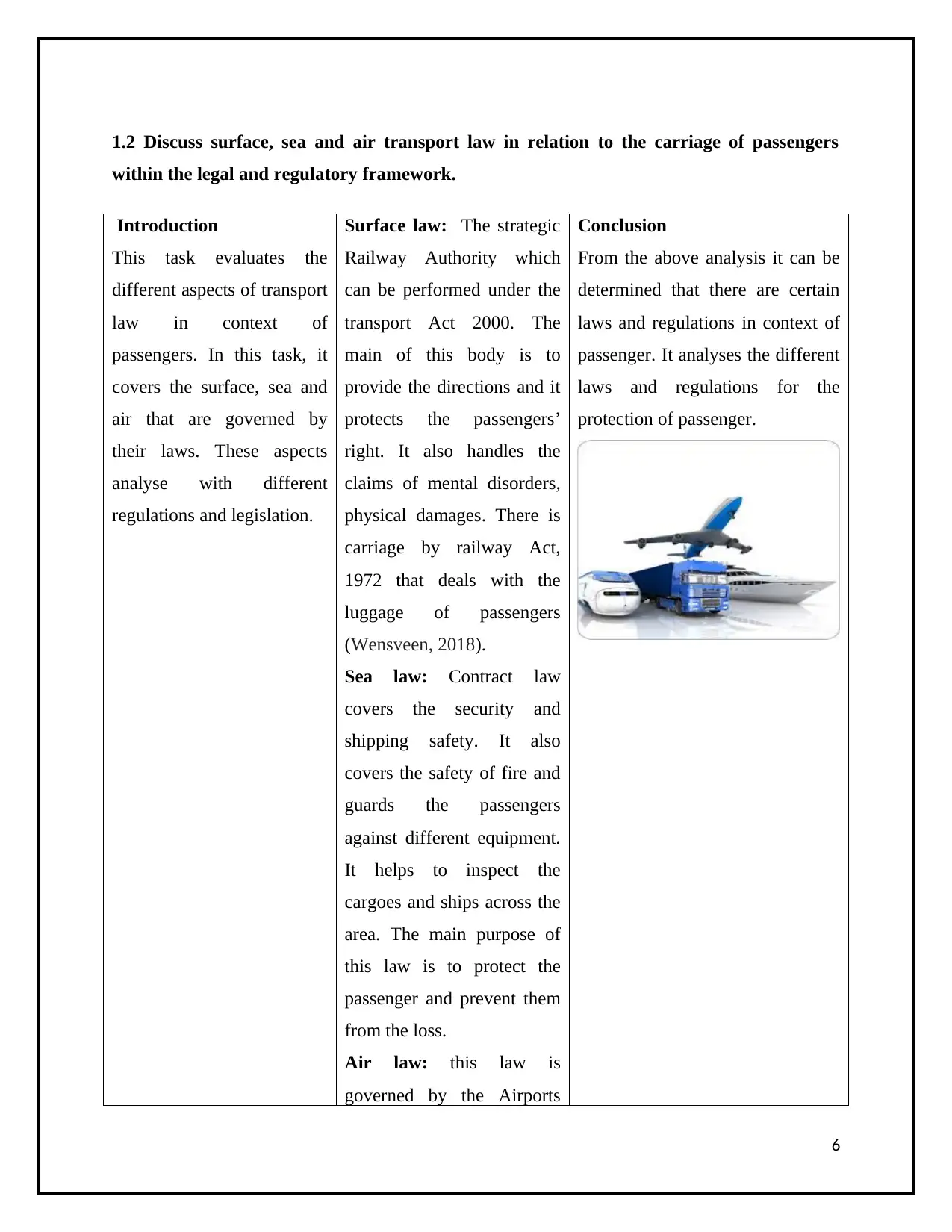
1.2 Discuss surface, sea and air transport law in relation to the carriage of passengers
within the legal and regulatory framework.
Introduction
This task evaluates the
different aspects of transport
law in context of
passengers. In this task, it
covers the surface, sea and
air that are governed by
their laws. These aspects
analyse with different
regulations and legislation.
Surface law: The strategic
Railway Authority which
can be performed under the
transport Act 2000. The
main of this body is to
provide the directions and it
protects the passengers’
right. It also handles the
claims of mental disorders,
physical damages. There is
carriage by railway Act,
1972 that deals with the
luggage of passengers
(Wensveen, 2018).
Sea law: Contract law
covers the security and
shipping safety. It also
covers the safety of fire and
guards the passengers
against different equipment.
It helps to inspect the
cargoes and ships across the
area. The main purpose of
this law is to protect the
passenger and prevent them
from the loss.
Air law: this law is
governed by the Airports
Conclusion
From the above analysis it can be
determined that there are certain
laws and regulations in context of
passenger. It analyses the different
laws and regulations for the
protection of passenger.
6
within the legal and regulatory framework.
Introduction
This task evaluates the
different aspects of transport
law in context of
passengers. In this task, it
covers the surface, sea and
air that are governed by
their laws. These aspects
analyse with different
regulations and legislation.
Surface law: The strategic
Railway Authority which
can be performed under the
transport Act 2000. The
main of this body is to
provide the directions and it
protects the passengers’
right. It also handles the
claims of mental disorders,
physical damages. There is
carriage by railway Act,
1972 that deals with the
luggage of passengers
(Wensveen, 2018).
Sea law: Contract law
covers the security and
shipping safety. It also
covers the safety of fire and
guards the passengers
against different equipment.
It helps to inspect the
cargoes and ships across the
area. The main purpose of
this law is to protect the
passenger and prevent them
from the loss.
Air law: this law is
governed by the Airports
Conclusion
From the above analysis it can be
determined that there are certain
laws and regulations in context of
passenger. It analyses the different
laws and regulations for the
protection of passenger.
6
⊘ This is a preview!⊘
Do you want full access?
Subscribe today to unlock all pages.

Trusted by 1+ million students worldwide
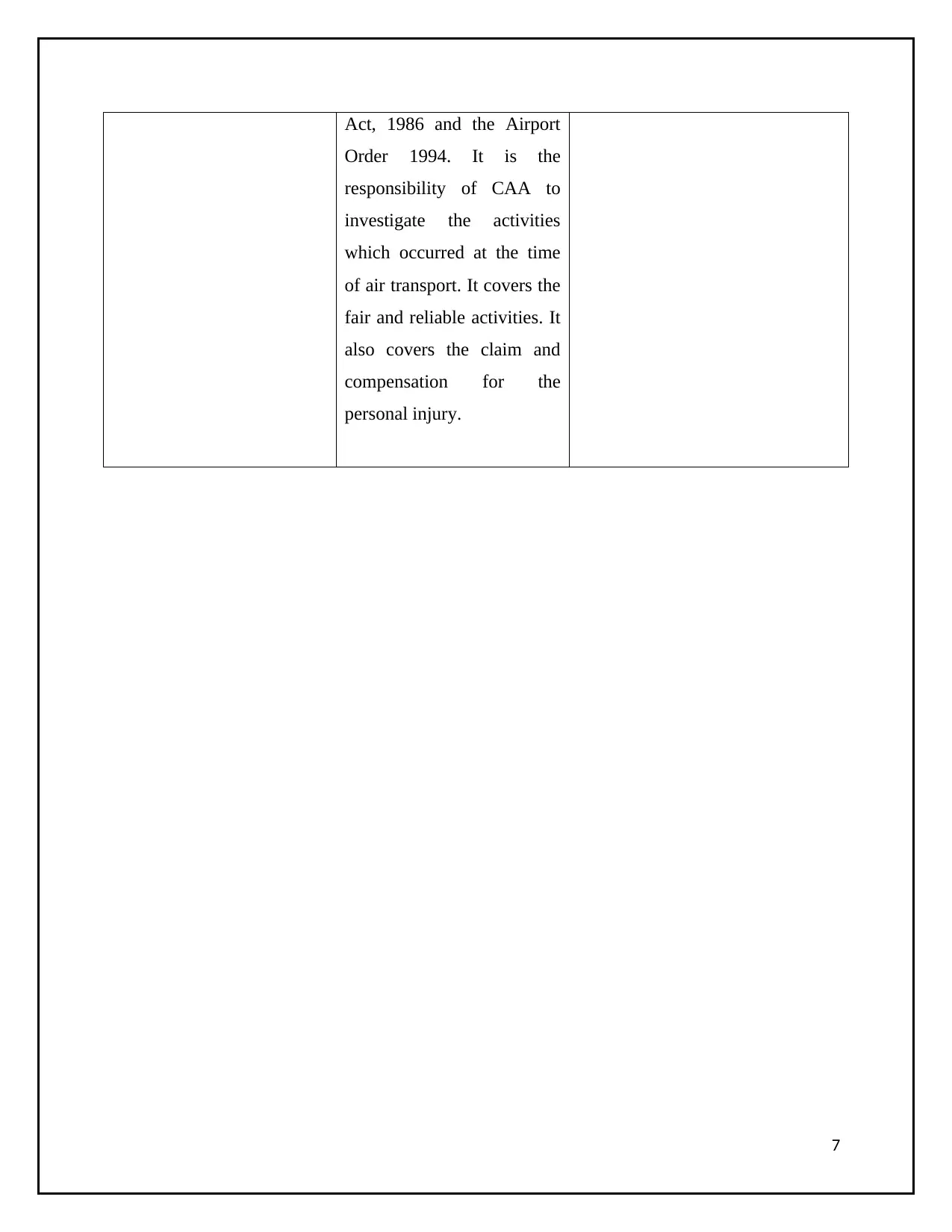
Act, 1986 and the Airport
Order 1994. It is the
responsibility of CAA to
investigate the activities
which occurred at the time
of air transport. It covers the
fair and reliable activities. It
also covers the claim and
compensation for the
personal injury.
7
Order 1994. It is the
responsibility of CAA to
investigate the activities
which occurred at the time
of air transport. It covers the
fair and reliable activities. It
also covers the claim and
compensation for the
personal injury.
7
Paraphrase This Document
Need a fresh take? Get an instant paraphrase of this document with our AI Paraphraser
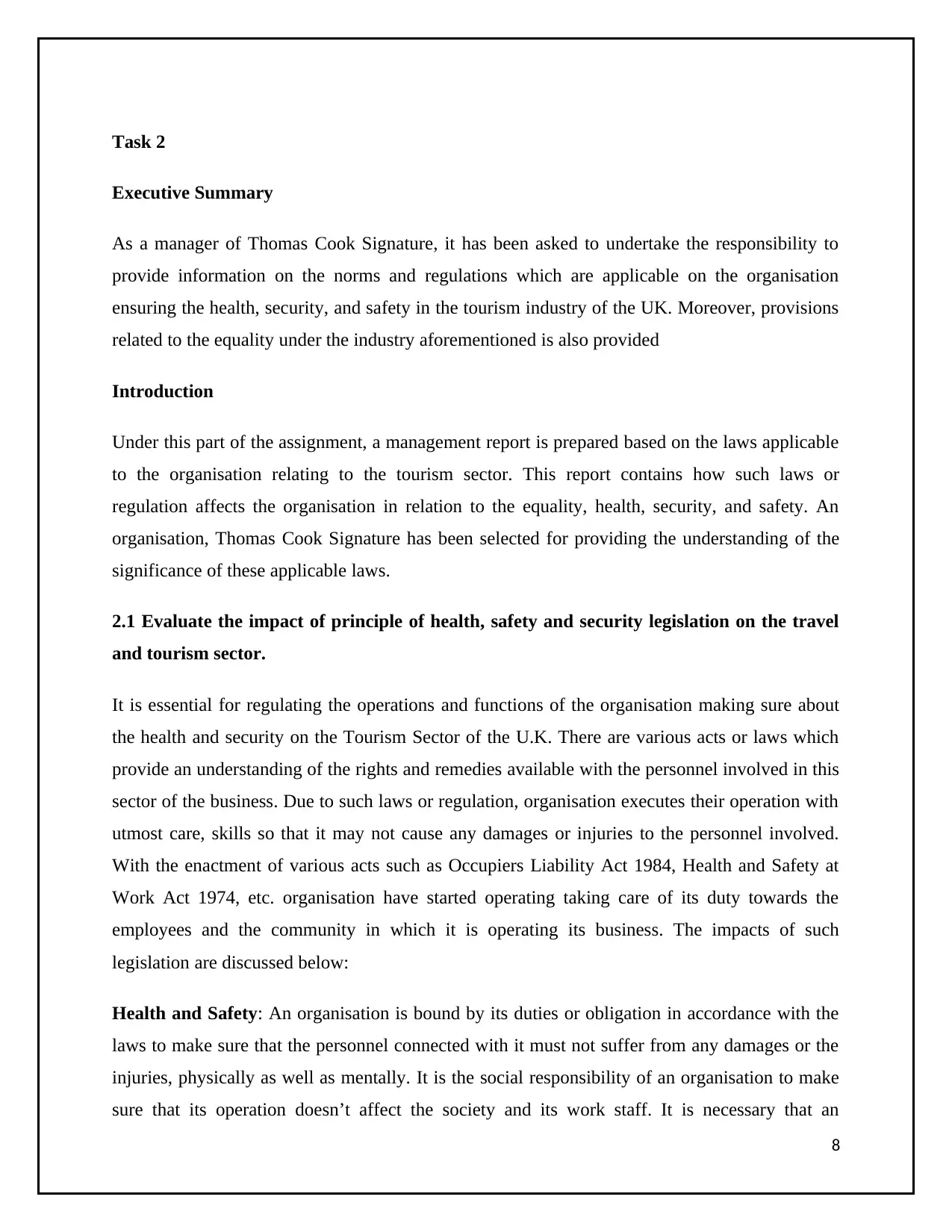
Task 2
Executive Summary
As a manager of Thomas Cook Signature, it has been asked to undertake the responsibility to
provide information on the norms and regulations which are applicable on the organisation
ensuring the health, security, and safety in the tourism industry of the UK. Moreover, provisions
related to the equality under the industry aforementioned is also provided
Introduction
Under this part of the assignment, a management report is prepared based on the laws applicable
to the organisation relating to the tourism sector. This report contains how such laws or
regulation affects the organisation in relation to the equality, health, security, and safety. An
organisation, Thomas Cook Signature has been selected for providing the understanding of the
significance of these applicable laws.
2.1 Evaluate the impact of principle of health, safety and security legislation on the travel
and tourism sector.
It is essential for regulating the operations and functions of the organisation making sure about
the health and security on the Tourism Sector of the U.K. There are various acts or laws which
provide an understanding of the rights and remedies available with the personnel involved in this
sector of the business. Due to such laws or regulation, organisation executes their operation with
utmost care, skills so that it may not cause any damages or injuries to the personnel involved.
With the enactment of various acts such as Occupiers Liability Act 1984, Health and Safety at
Work Act 1974, etc. organisation have started operating taking care of its duty towards the
employees and the community in which it is operating its business. The impacts of such
legislation are discussed below:
Health and Safety: An organisation is bound by its duties or obligation in accordance with the
laws to make sure that the personnel connected with it must not suffer from any damages or the
injuries, physically as well as mentally. It is the social responsibility of an organisation to make
sure that its operation doesn’t affect the society and its work staff. It is necessary that an
8
Executive Summary
As a manager of Thomas Cook Signature, it has been asked to undertake the responsibility to
provide information on the norms and regulations which are applicable on the organisation
ensuring the health, security, and safety in the tourism industry of the UK. Moreover, provisions
related to the equality under the industry aforementioned is also provided
Introduction
Under this part of the assignment, a management report is prepared based on the laws applicable
to the organisation relating to the tourism sector. This report contains how such laws or
regulation affects the organisation in relation to the equality, health, security, and safety. An
organisation, Thomas Cook Signature has been selected for providing the understanding of the
significance of these applicable laws.
2.1 Evaluate the impact of principle of health, safety and security legislation on the travel
and tourism sector.
It is essential for regulating the operations and functions of the organisation making sure about
the health and security on the Tourism Sector of the U.K. There are various acts or laws which
provide an understanding of the rights and remedies available with the personnel involved in this
sector of the business. Due to such laws or regulation, organisation executes their operation with
utmost care, skills so that it may not cause any damages or injuries to the personnel involved.
With the enactment of various acts such as Occupiers Liability Act 1984, Health and Safety at
Work Act 1974, etc. organisation have started operating taking care of its duty towards the
employees and the community in which it is operating its business. The impacts of such
legislation are discussed below:
Health and Safety: An organisation is bound by its duties or obligation in accordance with the
laws to make sure that the personnel connected with it must not suffer from any damages or the
injuries, physically as well as mentally. It is the social responsibility of an organisation to make
sure that its operation doesn’t affect the society and its work staff. It is necessary that an
8
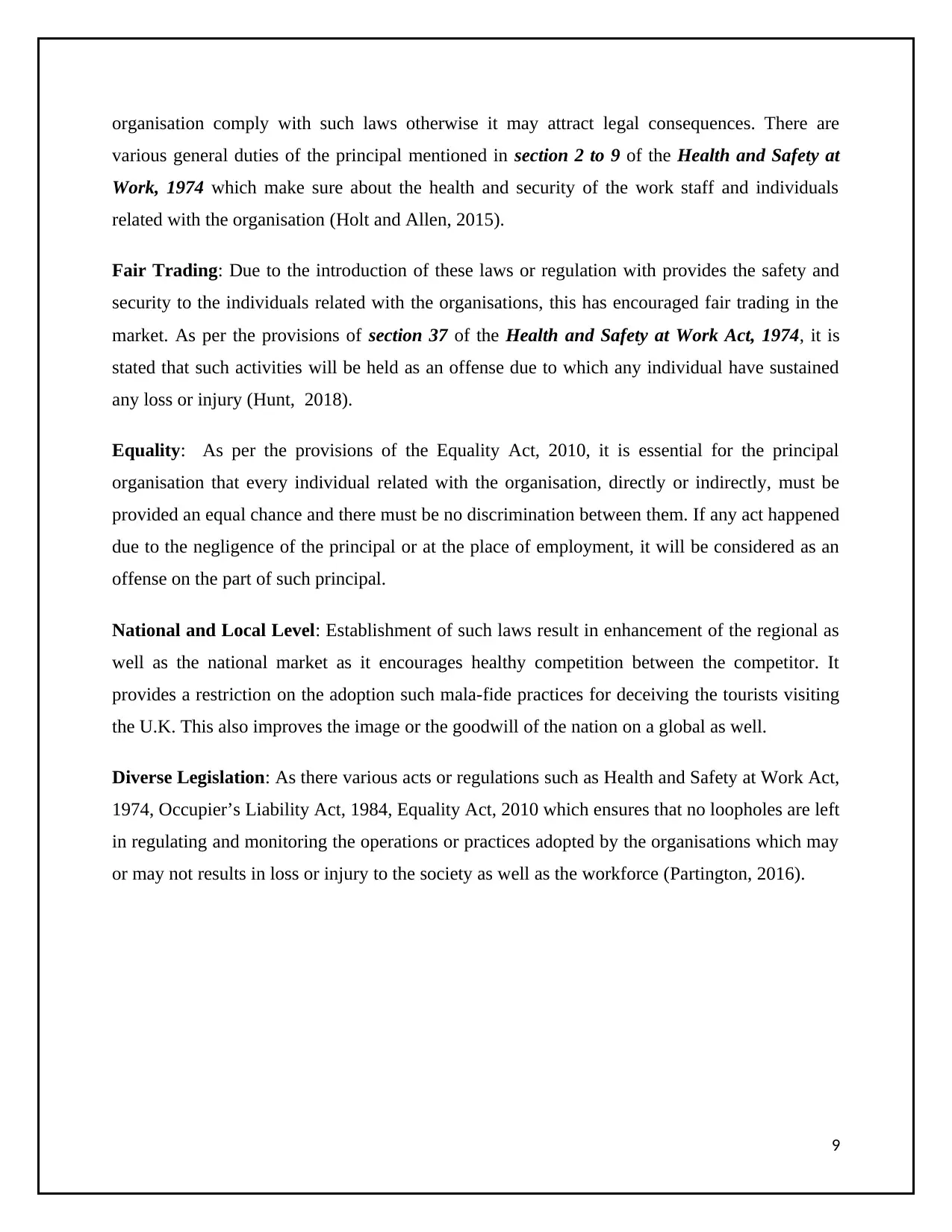
organisation comply with such laws otherwise it may attract legal consequences. There are
various general duties of the principal mentioned in section 2 to 9 of the Health and Safety at
Work, 1974 which make sure about the health and security of the work staff and individuals
related with the organisation (Holt and Allen, 2015).
Fair Trading: Due to the introduction of these laws or regulation with provides the safety and
security to the individuals related with the organisations, this has encouraged fair trading in the
market. As per the provisions of section 37 of the Health and Safety at Work Act, 1974, it is
stated that such activities will be held as an offense due to which any individual have sustained
any loss or injury (Hunt, 2018).
Equality: As per the provisions of the Equality Act, 2010, it is essential for the principal
organisation that every individual related with the organisation, directly or indirectly, must be
provided an equal chance and there must be no discrimination between them. If any act happened
due to the negligence of the principal or at the place of employment, it will be considered as an
offense on the part of such principal.
National and Local Level: Establishment of such laws result in enhancement of the regional as
well as the national market as it encourages healthy competition between the competitor. It
provides a restriction on the adoption such mala-fide practices for deceiving the tourists visiting
the U.K. This also improves the image or the goodwill of the nation on a global as well.
Diverse Legislation: As there various acts or regulations such as Health and Safety at Work Act,
1974, Occupier’s Liability Act, 1984, Equality Act, 2010 which ensures that no loopholes are left
in regulating and monitoring the operations or practices adopted by the organisations which may
or may not results in loss or injury to the society as well as the workforce (Partington, 2016).
9
various general duties of the principal mentioned in section 2 to 9 of the Health and Safety at
Work, 1974 which make sure about the health and security of the work staff and individuals
related with the organisation (Holt and Allen, 2015).
Fair Trading: Due to the introduction of these laws or regulation with provides the safety and
security to the individuals related with the organisations, this has encouraged fair trading in the
market. As per the provisions of section 37 of the Health and Safety at Work Act, 1974, it is
stated that such activities will be held as an offense due to which any individual have sustained
any loss or injury (Hunt, 2018).
Equality: As per the provisions of the Equality Act, 2010, it is essential for the principal
organisation that every individual related with the organisation, directly or indirectly, must be
provided an equal chance and there must be no discrimination between them. If any act happened
due to the negligence of the principal or at the place of employment, it will be considered as an
offense on the part of such principal.
National and Local Level: Establishment of such laws result in enhancement of the regional as
well as the national market as it encourages healthy competition between the competitor. It
provides a restriction on the adoption such mala-fide practices for deceiving the tourists visiting
the U.K. This also improves the image or the goodwill of the nation on a global as well.
Diverse Legislation: As there various acts or regulations such as Health and Safety at Work Act,
1974, Occupier’s Liability Act, 1984, Equality Act, 2010 which ensures that no loopholes are left
in regulating and monitoring the operations or practices adopted by the organisations which may
or may not results in loss or injury to the society as well as the workforce (Partington, 2016).
9
⊘ This is a preview!⊘
Do you want full access?
Subscribe today to unlock all pages.

Trusted by 1+ million students worldwide
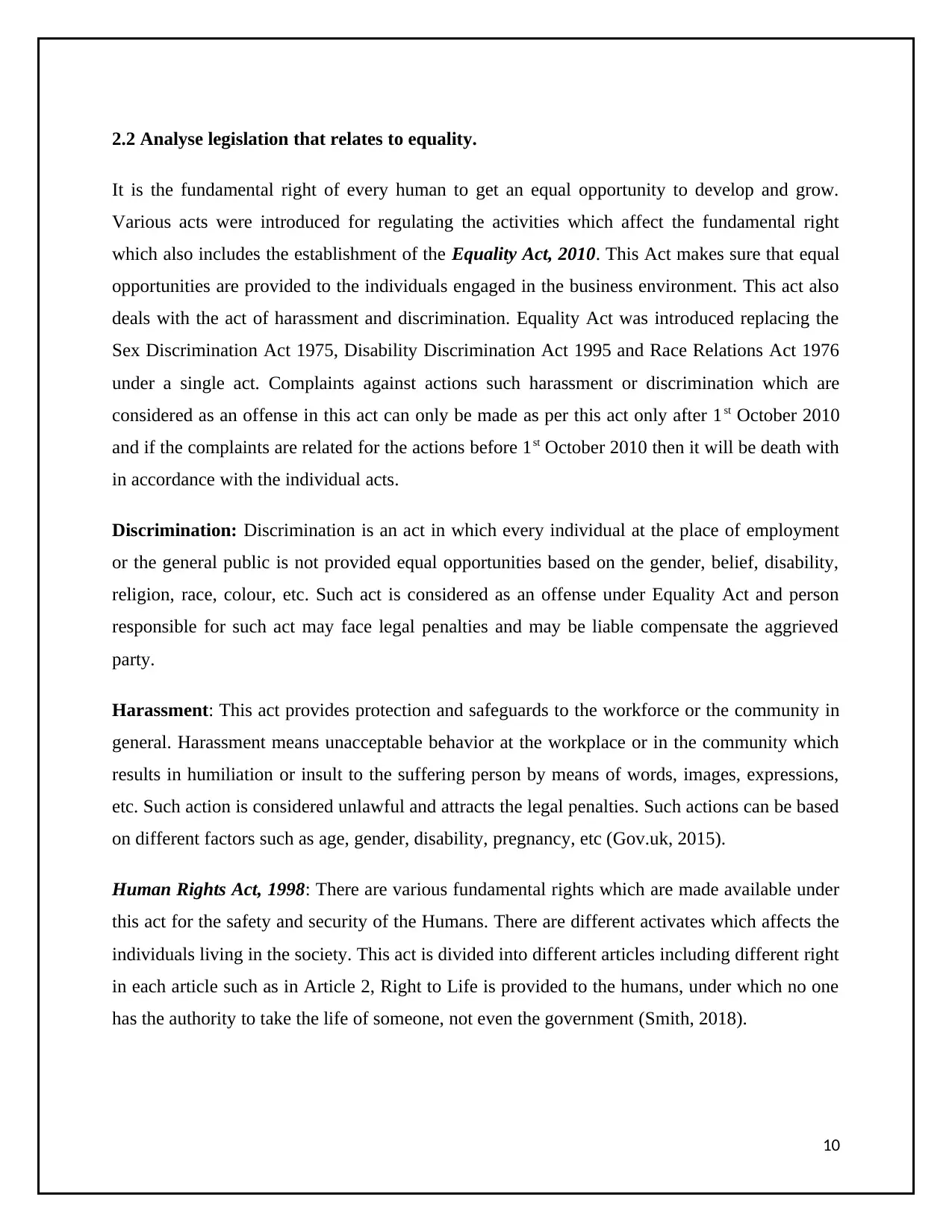
2.2 Analyse legislation that relates to equality.
It is the fundamental right of every human to get an equal opportunity to develop and grow.
Various acts were introduced for regulating the activities which affect the fundamental right
which also includes the establishment of the Equality Act, 2010. This Act makes sure that equal
opportunities are provided to the individuals engaged in the business environment. This act also
deals with the act of harassment and discrimination. Equality Act was introduced replacing the
Sex Discrimination Act 1975, Disability Discrimination Act 1995 and Race Relations Act 1976
under a single act. Complaints against actions such harassment or discrimination which are
considered as an offense in this act can only be made as per this act only after 1st October 2010
and if the complaints are related for the actions before 1st October 2010 then it will be death with
in accordance with the individual acts.
Discrimination: Discrimination is an act in which every individual at the place of employment
or the general public is not provided equal opportunities based on the gender, belief, disability,
religion, race, colour, etc. Such act is considered as an offense under Equality Act and person
responsible for such act may face legal penalties and may be liable compensate the aggrieved
party.
Harassment: This act provides protection and safeguards to the workforce or the community in
general. Harassment means unacceptable behavior at the workplace or in the community which
results in humiliation or insult to the suffering person by means of words, images, expressions,
etc. Such action is considered unlawful and attracts the legal penalties. Such actions can be based
on different factors such as age, gender, disability, pregnancy, etc (Gov.uk, 2015).
Human Rights Act, 1998: There are various fundamental rights which are made available under
this act for the safety and security of the Humans. There are different activates which affects the
individuals living in the society. This act is divided into different articles including different right
in each article such as in Article 2, Right to Life is provided to the humans, under which no one
has the authority to take the life of someone, not even the government (Smith, 2018).
10
It is the fundamental right of every human to get an equal opportunity to develop and grow.
Various acts were introduced for regulating the activities which affect the fundamental right
which also includes the establishment of the Equality Act, 2010. This Act makes sure that equal
opportunities are provided to the individuals engaged in the business environment. This act also
deals with the act of harassment and discrimination. Equality Act was introduced replacing the
Sex Discrimination Act 1975, Disability Discrimination Act 1995 and Race Relations Act 1976
under a single act. Complaints against actions such harassment or discrimination which are
considered as an offense in this act can only be made as per this act only after 1st October 2010
and if the complaints are related for the actions before 1st October 2010 then it will be death with
in accordance with the individual acts.
Discrimination: Discrimination is an act in which every individual at the place of employment
or the general public is not provided equal opportunities based on the gender, belief, disability,
religion, race, colour, etc. Such act is considered as an offense under Equality Act and person
responsible for such act may face legal penalties and may be liable compensate the aggrieved
party.
Harassment: This act provides protection and safeguards to the workforce or the community in
general. Harassment means unacceptable behavior at the workplace or in the community which
results in humiliation or insult to the suffering person by means of words, images, expressions,
etc. Such action is considered unlawful and attracts the legal penalties. Such actions can be based
on different factors such as age, gender, disability, pregnancy, etc (Gov.uk, 2015).
Human Rights Act, 1998: There are various fundamental rights which are made available under
this act for the safety and security of the Humans. There are different activates which affects the
individuals living in the society. This act is divided into different articles including different right
in each article such as in Article 2, Right to Life is provided to the humans, under which no one
has the authority to take the life of someone, not even the government (Smith, 2018).
10
Paraphrase This Document
Need a fresh take? Get an instant paraphrase of this document with our AI Paraphraser
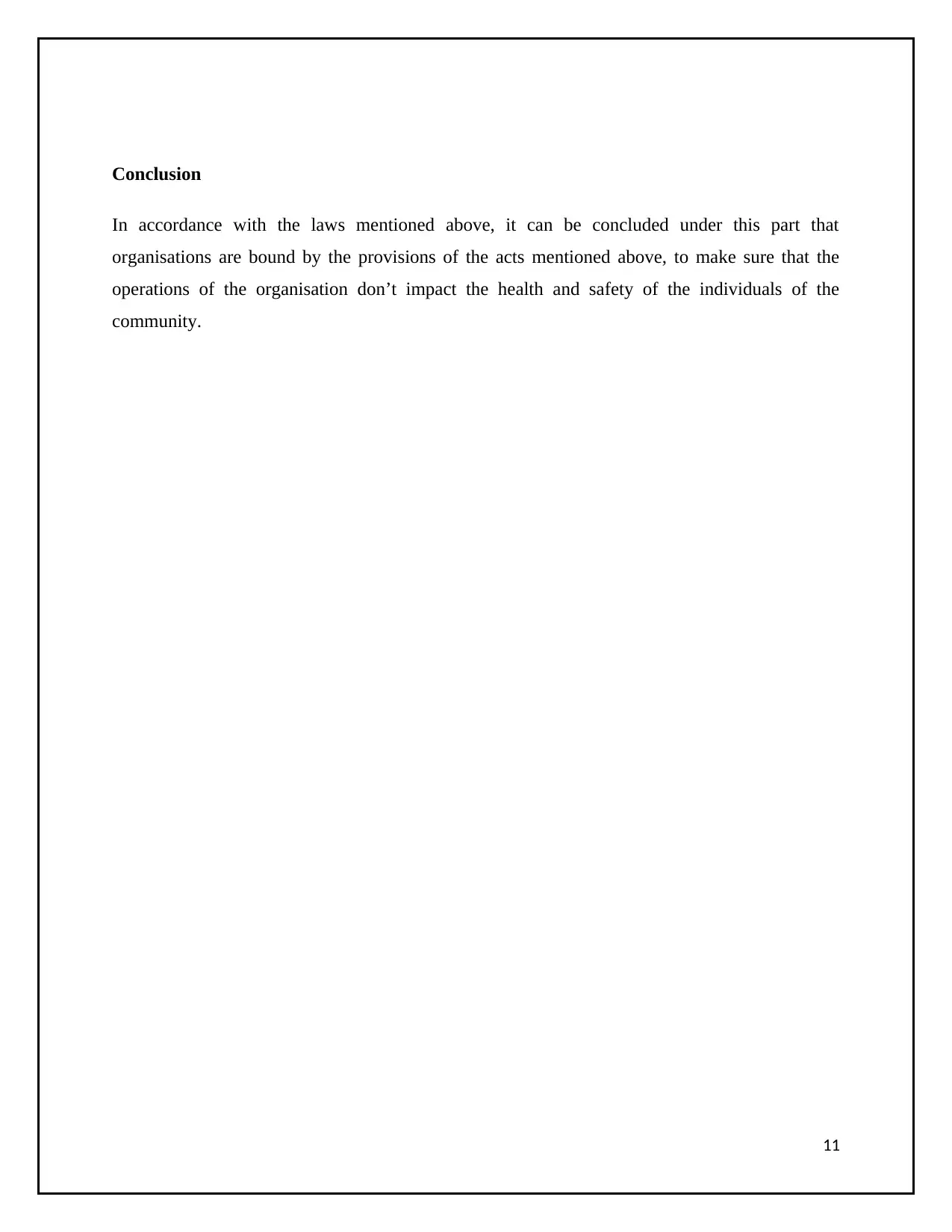
Conclusion
In accordance with the laws mentioned above, it can be concluded under this part that
organisations are bound by the provisions of the acts mentioned above, to make sure that the
operations of the organisation don’t impact the health and safety of the individuals of the
community.
11
In accordance with the laws mentioned above, it can be concluded under this part that
organisations are bound by the provisions of the acts mentioned above, to make sure that the
operations of the organisation don’t impact the health and safety of the individuals of the
community.
11
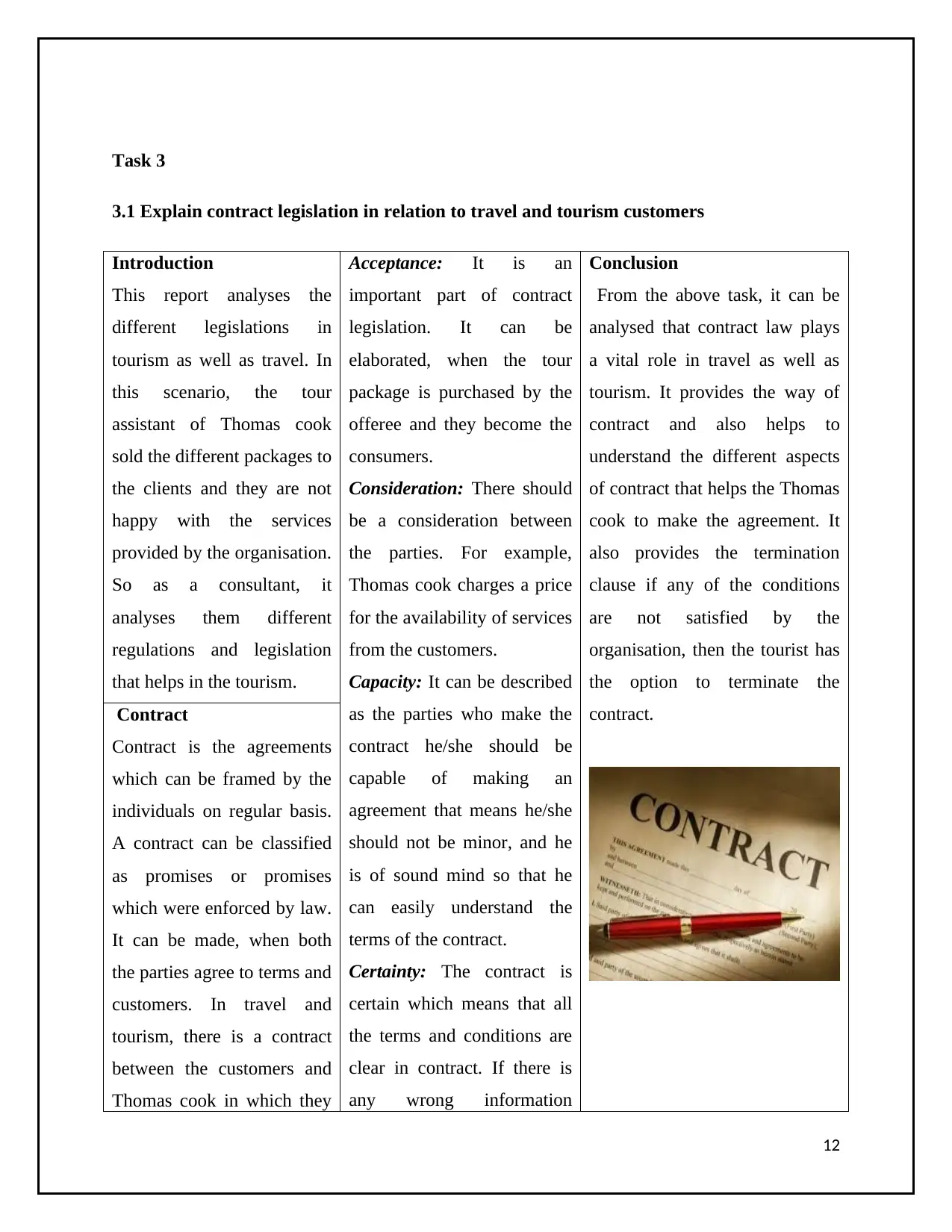
Task 3
3.1 Explain contract legislation in relation to travel and tourism customers
Introduction
This report analyses the
different legislations in
tourism as well as travel. In
this scenario, the tour
assistant of Thomas cook
sold the different packages to
the clients and they are not
happy with the services
provided by the organisation.
So as a consultant, it
analyses them different
regulations and legislation
that helps in the tourism.
Acceptance: It is an
important part of contract
legislation. It can be
elaborated, when the tour
package is purchased by the
offeree and they become the
consumers.
Consideration: There should
be a consideration between
the parties. For example,
Thomas cook charges a price
for the availability of services
from the customers.
Capacity: It can be described
as the parties who make the
contract he/she should be
capable of making an
agreement that means he/she
should not be minor, and he
is of sound mind so that he
can easily understand the
terms of the contract.
Certainty: The contract is
certain which means that all
the terms and conditions are
clear in contract. If there is
any wrong information
Conclusion
From the above task, it can be
analysed that contract law plays
a vital role in travel as well as
tourism. It provides the way of
contract and also helps to
understand the different aspects
of contract that helps the Thomas
cook to make the agreement. It
also provides the termination
clause if any of the conditions
are not satisfied by the
organisation, then the tourist has
the option to terminate the
contract.Contract
Contract is the agreements
which can be framed by the
individuals on regular basis.
A contract can be classified
as promises or promises
which were enforced by law.
It can be made, when both
the parties agree to terms and
customers. In travel and
tourism, there is a contract
between the customers and
Thomas cook in which they
12
3.1 Explain contract legislation in relation to travel and tourism customers
Introduction
This report analyses the
different legislations in
tourism as well as travel. In
this scenario, the tour
assistant of Thomas cook
sold the different packages to
the clients and they are not
happy with the services
provided by the organisation.
So as a consultant, it
analyses them different
regulations and legislation
that helps in the tourism.
Acceptance: It is an
important part of contract
legislation. It can be
elaborated, when the tour
package is purchased by the
offeree and they become the
consumers.
Consideration: There should
be a consideration between
the parties. For example,
Thomas cook charges a price
for the availability of services
from the customers.
Capacity: It can be described
as the parties who make the
contract he/she should be
capable of making an
agreement that means he/she
should not be minor, and he
is of sound mind so that he
can easily understand the
terms of the contract.
Certainty: The contract is
certain which means that all
the terms and conditions are
clear in contract. If there is
any wrong information
Conclusion
From the above task, it can be
analysed that contract law plays
a vital role in travel as well as
tourism. It provides the way of
contract and also helps to
understand the different aspects
of contract that helps the Thomas
cook to make the agreement. It
also provides the termination
clause if any of the conditions
are not satisfied by the
organisation, then the tourist has
the option to terminate the
contract.Contract
Contract is the agreements
which can be framed by the
individuals on regular basis.
A contract can be classified
as promises or promises
which were enforced by law.
It can be made, when both
the parties agree to terms and
customers. In travel and
tourism, there is a contract
between the customers and
Thomas cook in which they
12
⊘ This is a preview!⊘
Do you want full access?
Subscribe today to unlock all pages.

Trusted by 1+ million students worldwide
1 out of 23
Related Documents
Your All-in-One AI-Powered Toolkit for Academic Success.
+13062052269
info@desklib.com
Available 24*7 on WhatsApp / Email
![[object Object]](/_next/static/media/star-bottom.7253800d.svg)
Unlock your academic potential
Copyright © 2020–2025 A2Z Services. All Rights Reserved. Developed and managed by ZUCOL.



